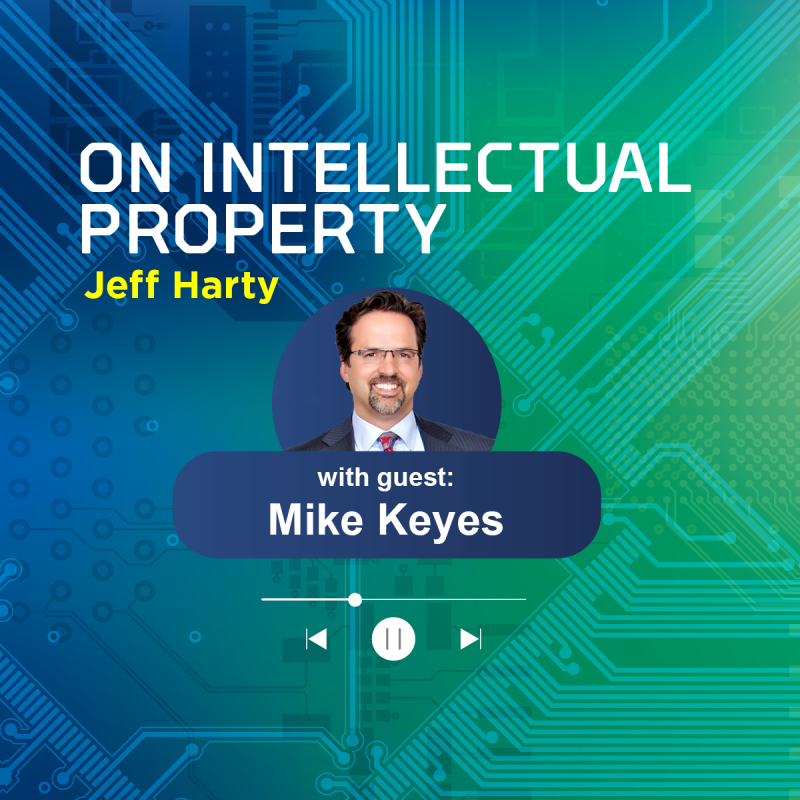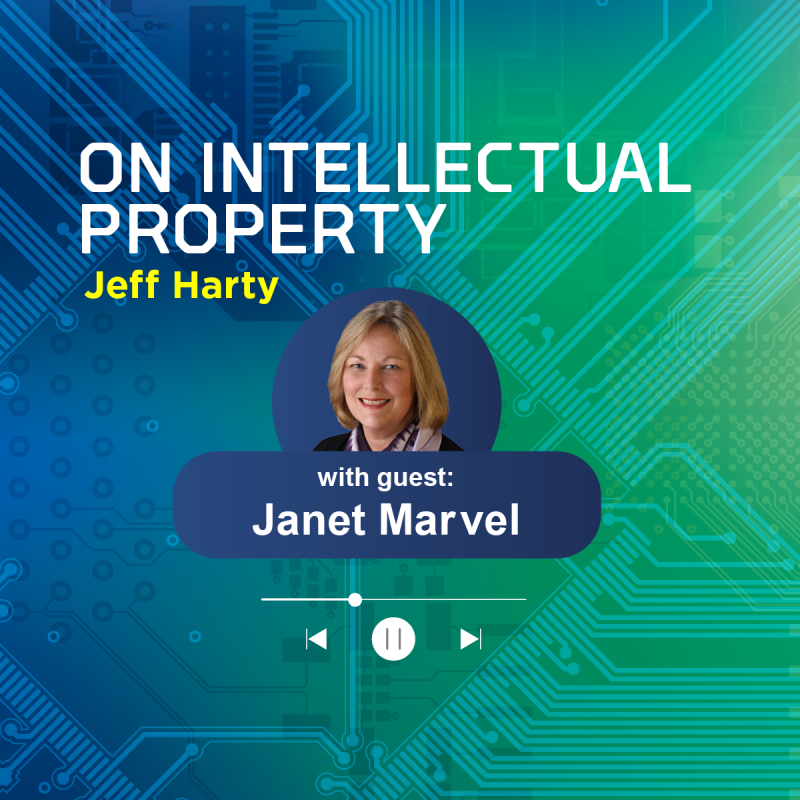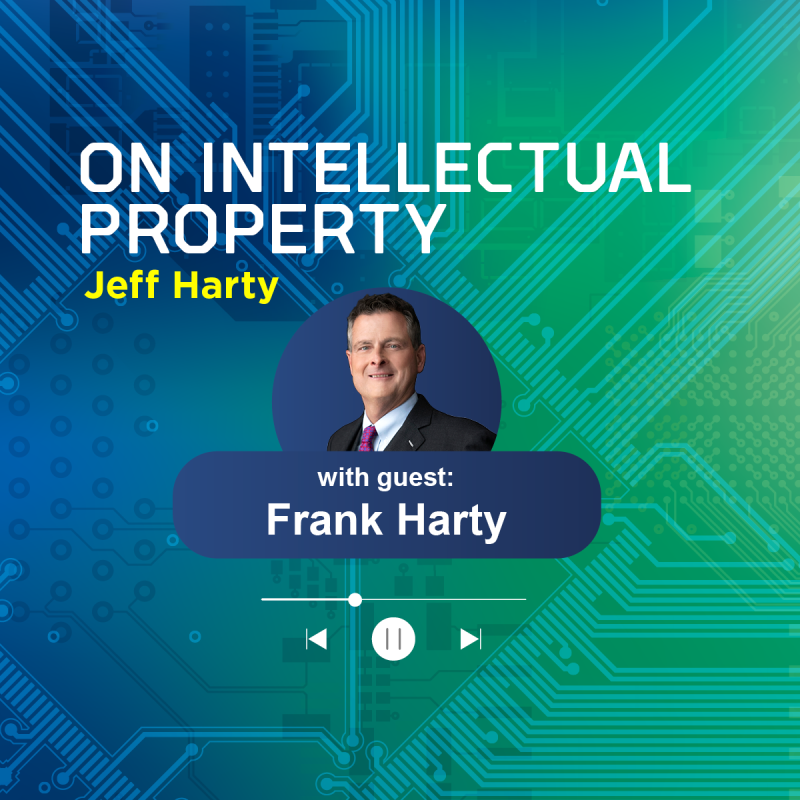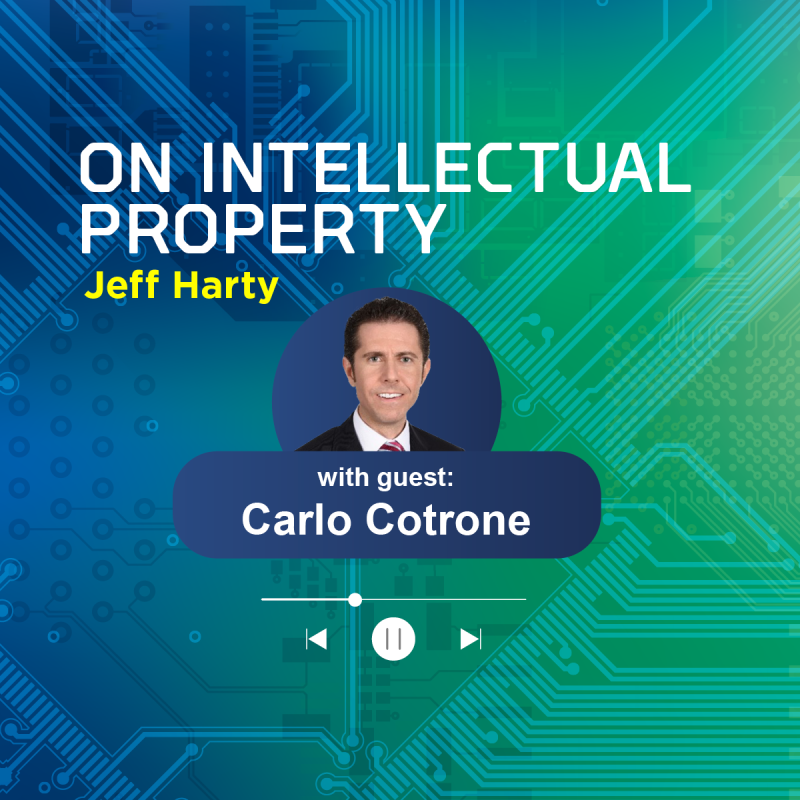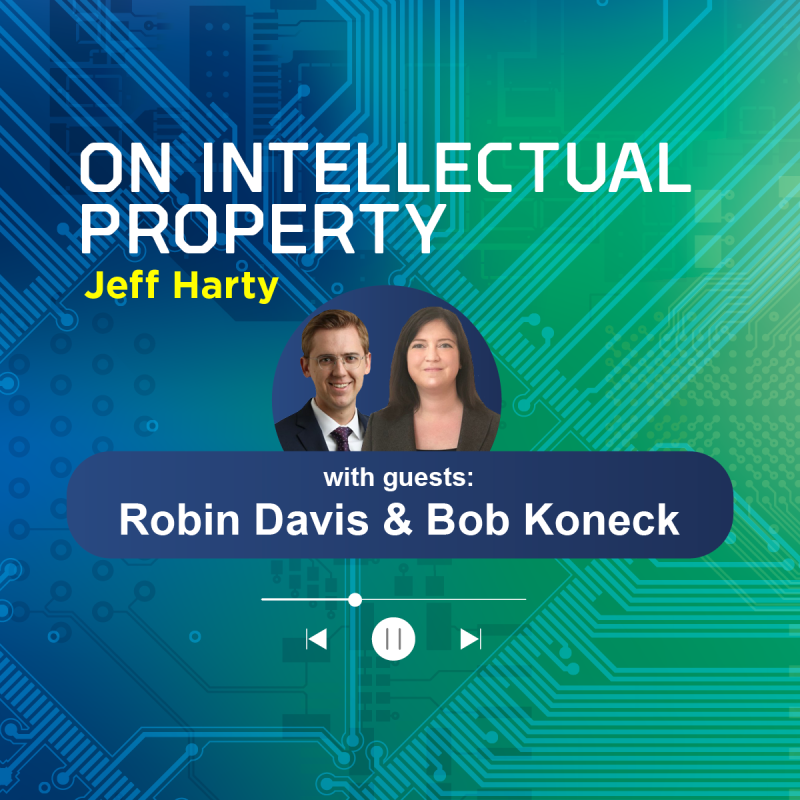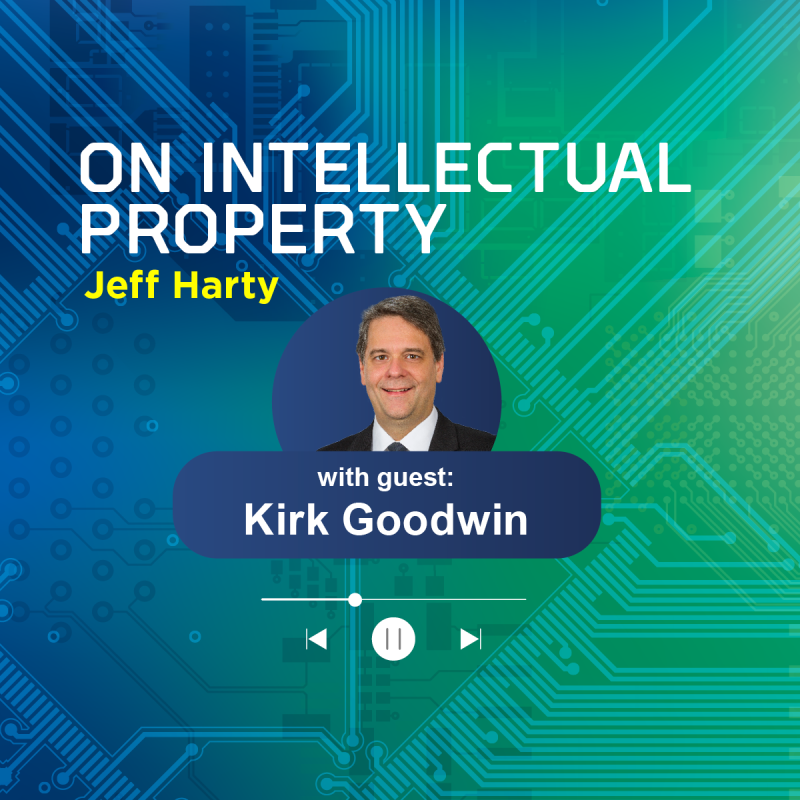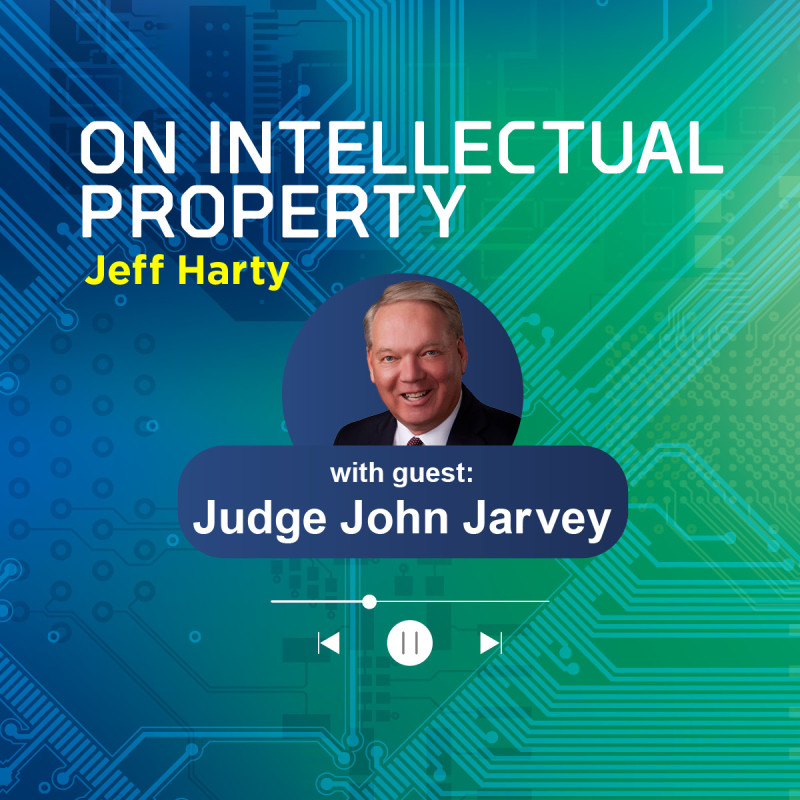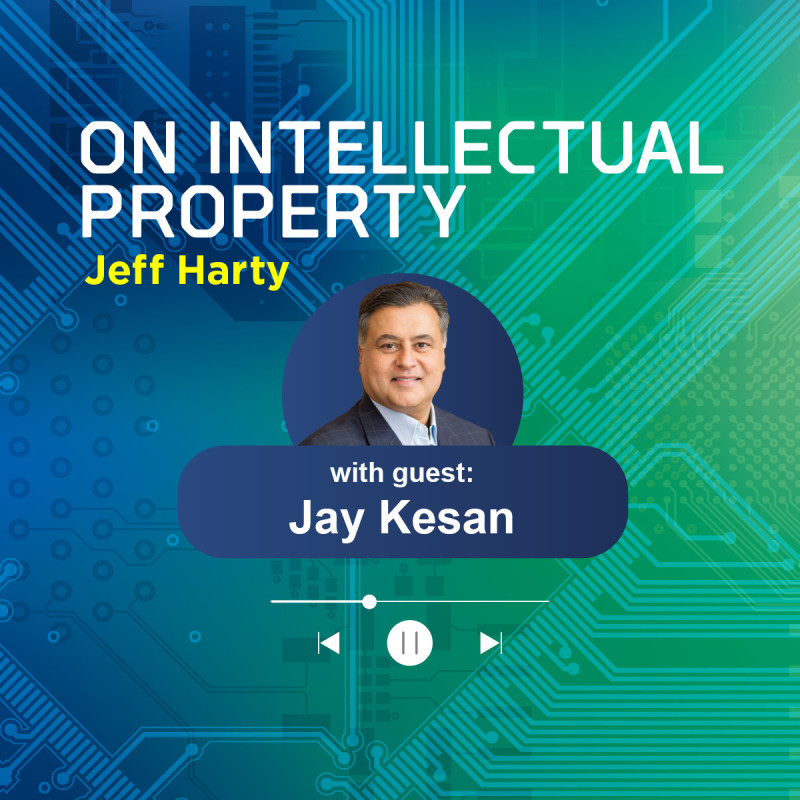
On Intellectual Property
We live in very innovative times where intellectual property rights - patents, trademarks, copyrights, and trade secrets - are a key component to the future success of almost any career or business.
Join Jeff Harty biweekly as he interviews patent and trademark professors, in house IP counsel, business leaders, IP trial attorneys and even members of the judiciary who will provide unique perspectives on what it takes to develop a successful strategy in dealing with intellectual property. Whether you are interested in intellectual property protection, enforcing IP rights or defending IP disputes, this is the podcast for you.
Welcome to Season 2 of the On Intellectual Property Podcast! We welcome Judge Randall Rader and welcome back Jay Kesan for a conversation on all things patent.
In this episode, Jeff Harty, Judge Randall Rader, and IP attorney and law professor Jay Kesan discuss:
- AIA, the PTAB, and PTAB Reform (the Prevail Act)
- Global patent trends and what it means for the U.S. innovation economy
- Apportionment in patent damages
- From E.D. of Texas to W.D. of Texas to Delaware: hot patent courts
- Effective appellate advocacy
Key Takeaways:
- Adequately protecting the technology of tomorrow requires looking beyond your own country’s law. We cannot simply look to U.S. intellectual property law but must consider the global interplay in patent law.
- IP is about strategy. In a worldwide dispute, you want to be able to settle in the United States, even if you use leverage from other countries to give you the best strategy for your desired settlement.
- It is about more than just the cash value. There is also cost value and market value to be considered in apportionment.
- In appellate work, you are looking for a single, reversible error. You need to be able to discern the one error that should be corrected, why it is reversible, and then be clear and convincing on that point.
“I feel like putting a model or submitting a model forces me to submit, essentially, an embodiment and example. And I would hate to be limited to the example or the model that I submit. Part of the beauty of the claims system is that you’re drafting the claims to capture all those examples and models and so on. And I’d hate to be deprived of that by having a model submitted or basically lose that flexibility at the altar of definiteness or preciseness.” —Jay Kesan
Connect with Judge Randall Rader:
Bio: https://www.law.gwu.edu/randall-r-rader
Website: https://www.theradergrouppllc.com/
Connect with Jay Kesan:
Bio: https://jaykesan.com/about-me/
Website: https://jaykesan.com/
Email: jay@jaykesan.com
Books: https://jaykesan.com/books/
Twitter: https://twitter.com/JayKesanP
LinkedIn: https://www.linkedin.com/in/jaykesan/
YouTube: https://www.youtube.com/channel/UCENwROk5ywajSVoJWUX9SBA/featured
If you missed it, check out our first episode with Jay Kesan: The PTAB And The Impact Of Post-Issuance Invalidity Proceedings With Jay Kesan
Connect with Jeff Harty:
Website: https://nyemaster.com/attorney-directory/jeffrey-d-harty/
Email: jharty@nyemaster.com
In our innovation economy, trademarks and trademark protection are likely to play a significant role in an intellectual property strategy. We know companies spend lots of time and money investing in brands as they compete for consumer attention and recognition. We also know that surveys play an important role in trademark and unfair competition cases. In particular, that’s because so many inquiries are focused on the perceptions of the average, reasonably prudent consumer. How do we measure that? How do we assess that? It sets the stage for a potential consumer survey, which introduces both technical and strategic questions. Featured guest Mike Keyes is uniquely qualified to help us better understand the effective use of trademark surveys, both from an academic and a practical litigation perspective.
In this episode, Jeff Harty and Mike Keyes discuss:
- The evolution of survey evidence in court cases.
- Common ways surveys are used in trademark and advertising litigation.
- The role lawyers and survey experts play in consumer surveys.
- Why surveys are approachable subject matter and evidence for jurors (and how they can be looked upon unfavorably).
- Hurdles to the admissibility of survey evidence.
Key Takeaways:
- The treatment of expert testimony under Federal Rules of Evidence 702 and 703 contributed to the growth of consumer surveys in litigation, and now it is not unusual for judges to expect to see surveys in Lanham Act cases.
- When it comes to secondary meaning and likelihood of confusion, surveys can be beneficial and can be powerful and persuasive pieces of evidence.
- Different types of trademark survey designs can be used depending on what litigators are trying to show, such as genericism, acquired distinctiveness, or likelihood of confusion.
- There's both art and science to putting together a survey questionnaire that’s clear, concise, and not leading or biasing survey respondents.
“Survey evidence doesn’t show actual confusion—what it’s trying to test for. It’s a tool to assess how consumers’ perceptions are in the real-world marketplace. And because it’s really trying to get at that issue, it’s important to replicate marketplace conditions in terms of how consumers encounter the marks at issue during the survey process.” —Mike Keyes
About Mike Keyes:
Mike Keyes is the co-head of Dorsey’s trial group and a go-to intellectual property and commercial litigation trial attorney with a vast reservoir of experience in cases involving trademarks, copyrights, and false advertising, including individual consumer and class action claims. Mike and his team have represented some of the world’s most recognized brands and companies in high-stakes litigation in federal courts across the country including Washington, Oregon, California, Colorado, Minnesota, Illinois, New York, Massachusetts, Utah, and Florida. These disputes have encompassed subject matters including medical diagnostics software, online games and apps, Google Ads, social media, e-books, consumer products, food and beverage, fashion, sports equipment, educational testing tools, and hospitality services.
Connect with Mike Keyes:
Website: https://www.dorsey.com/
LinkedIn: https://www.linkedin.com/in/mike-keyes-7b6a134/
Email: keyes.mike@dorsey.com
Connect with Jeff Harty:
Website: https://nyemaster.com/attorney-directory/jeffrey-d-harty/
Email: jharty@nyemaster.com
LinkedIn: https://www.linkedin.com/in/jeff-harty-5a9a1643/
This is a particularly special episode for me because I’m joined by friend and colleague Todd Van Thomme. When you feel stuck in your work, you need a fresh idea or a new way to think about an issue. A colleague you can turn to for help, guidance, or a new way to frame the issue can lead you toward solving your problem. When it comes to protecting inventions, patent prosecution, and building strong portfolios, Todd is right at the top of my go-to list. I know from experience working with Todd that he always prosecutes patents with a strategy in mind and a purpose. That is what he is going to share with us.
In this episode, Jeff Harty and Todd Van Thomme discuss:
- Todd’s unique journey to the intellectual property field.
- The early stages of IP for preserving and maintaining the right.
- Best practices for application success.
- Taking a collaborative approach with the examiner.
Key Takeaways:
- Listen as much as possible. It is crucial to understand the client’s business and goals.
- When developing an IP portfolio, sometimes the failures help to define the better way to write the application or story. It helps to understand how the client reached that point and the possible scope of their invention.
- Although conducting an examiner interview may cost a little more upfront in the IP application process, it very well may save considerable money later as it often speeds up the application and examination process.
- There is value in tapping someone who primarily does patent litigation to get a different viewpoint on protecting inventions.
“If I had my choice, I’d conduct an interview in virtually every case. It fosters some of that collaborative interaction with the examiner. Most examiners, I think, are willing to have those kinds of conversations at virtually every stage.” —Todd Van Thomme
Episode References:
- LexisNexis Pathways: https://www.lexisnexisip.com/solutions/patent-drafting/tech-center-navigator/
- LexisNexis Patent Advisor: https://www.lexisnexisip.com/solutions/patent-prosecution/patentadvisor/
About Todd Van Thomme:
An inventor and entrepreneur, Todd Van Thomme's experience with his own start-up company helps him understand both the legal challenges and the day-to-day issues of running a business.
In his intellectual property practice, Todd partners with clients to identify and collaborate on mechanical, chemical, nutraceutical, pharmaceutical, and food science-related intellectual property needs. He drafts and prosecutes both utility and design patent applications. He also drafts patentability, non-infringement, and invalidity opinions, especially for patents and patent applications. He counsels clients on how to avoid IP disputes and works with clients to resolve them when they do occur. Todd also prepares, files, and prosecutes trademark applications.
His combination of legal and entrepreneurial experience brings unexpected benefits for clients. As a former secondment in-house counsel for Whirlpool Corp. and the inventor and owner of Giftzapz, a patent pending gift list-sharing app, Todd has gained a client’s perspective of a business.
As president of the Association of Intellectual Property Firms, Todd developed close personal relationships with thought leaders in the larger intellectual property legal community around the world. He uses those personal connections to aid clients in protecting their IP worldwide, taking a globally strategic view of patent and trademark prosecution.
Connect with Todd Van Thomme:
Website: https://nyemaster.com/attorney-directory/todd-a-van-thomme/
Email: tvanthomme@nyemaster.com
LinkedIn: https://www.linkedin.com/in/toddvanthomme/
Connect with Jeff Harty:
Website: https://nyemaster.com/attorney-directory/jeffrey-d-harty/
Email: jharty@nyemaster.com
LinkedIn: https://www.linkedin.com/in/jeff-harty-5a9a1643/
We’re taking a critical look at one of the most important parts of a patent case: claim construction. Michael Friedland, co-chair of Knobbe Martens’ litigation practice group, is uniquely qualified to help us unpack claim construction, advocacy, and the importance of natural language—utilizing plain and ordinary meanings when urging proposed constructions of disputed claim language.
In this episode, Jeff Harty and Michael Friedland discuss:
- The role of claim construction in a patent dispute.
- Balancing the simplification of technology so a judge can understand it without simplifying to the point of inaccuracy.
- Knowing your audience and changing your approach to the court.
- The role of expert testimony in claim construction (and when not to use an expert).
Key Takeaways:
- Keep it clear, keep it simple, and work together with the court to sort out any confusion regarding the relevant technology and to adopt the proper interpretation of the claim language.
- Start giving claim construction serious thought when you first look into the case, even before it is filed.
- A good brief can help somebody pick which claim construction to use and help them get it right.
- The simpler claim construction is often the one that wins. An expert is someone outside your control and can cause confusion when it wasn’t necessary based on the record you already have.
“I want whatever we are doing to seem simple, natural, and not contrived.” —Michael Friedland
About Michael Friedland:
Mike has three decades of intellectual property enforcement experience and is the co-chair of Knobbe Martens’ litigation practice group. Since 2000, he has represented clients in more than 200 intellectual property cases in courts in California and 21 other states.
Focused on patent, trademark, trade secret, and copyright matters, Mike’s cases have spanned a range of industries and technologies, including consumer products, semiconductors, tactical products, medical devices, computer software, apparel, restaurants, and financial services.
He has represented brand-name companies including Oakley, Luxottica, ITT, Makita, Pacific Life Insurance Company, Carl’s Jr., Microsemi, NASCAR, Daytona International Speedway, Game Show Network, Razor, Volcom, Specialized Bicycle, Mexicana Airlines, and SRS Labs.
Mike is the secretary of the Harvard Law School Association and a member of its executive committee. He is a co-founder and former president of the Harvard Law School Association of Orange County. He is a member of INTA’s Alternative Dispute Resolution Committee. Mike has taught as an adjunct professor at the Whittier School of Law and served as a JAG officer with the California State Military Reserve. He worked as a reserve deputy with the Orange County Sheriff’s Department for 16 years, retiring as a lieutenant.
Connect with Michael Friedland:
Website: https://www.knobbe.com/
Website: https://www.knobbe.com/attorneys/michael-friedland
Email: michael.friedland@knobbe.com
LinkedIn: https://www.linkedin.com/in/michael-friedland-43a76a1/
Connect with Jeff Harty:
Website: https://nyemaster.com/attorney-directory/jeffrey-d-harty/
Email: jharty@nyemaster.com
LinkedIn: https://www.linkedin.com/in/jeff-harty-5a9a1643/
For trademark owners, increasing brand recognition can sometimes be a mixed blessing. Well-known marks can start to be more than just strong source identifiers. They can be the targets of parody, criticism, social commentary, and other uses that go beyond the consumer goodwill attached to a mark. Concerns about free expression and free speech start to enter the equation. Featured guest Janet Marvel helps unpack the interplay between recognizing trademark rights while protecting expression that falls within the purview of the First Amendment. She’s a talented and experienced trademark practitioner, instructor, and author. We are fortunate to have her share her knowledge and insights on this area of trademark law.
In this episode, Jeff Harty and Janet Marvel discuss:
- Brand essence and the power of brands.
- Developing a good brand strategy.
- Counterfeiting and e-commerce.
- The balance between free speech and trademark protection.
Key Takeaways:
- Trademarks provide valuable functions for both consumers and sellers of goods and services.
- You have to think about a global stage for your major business operations and trademark strategy, not just your local country.
- The U.S. Ninth Circuit Court has gone from artistic work to expressive work in its interpretation of the Rogers case. It is possible that they have expanded their view of First Amendment protection too far. We look forward to the Supreme Court soon providing guidance in the Jack Daniels case.
“Protecting your trademarks, in that respect of thinking about stopping counterfeiters, is important. You can’t stop a counterfeiter under the federal statute without a registration. So you want to have a registration, and you want to think about where you’re manufacturing.” —Janet Marvel
About Janet Marvel:
Pattishall partner Janet Marvel protects brands, copyrighted works, and domain names throughout the world. She has been charged with protecting the trademarks of world-famous brands, such as Ford, Pepsi, Harlequin (romance novels), and Mattel. She even protects the famous Cheesehead hat on view during the NFL season when the Green Bay Packers play.
As part of her practice, Janet represents plaintiffs and defendants in a wide variety of disputes involving trademark, copyright, rights of publicity, breach of contract, unfair competition, and false advertising. She has successfully tried cases and litigated around the country in state and federal courts and before the U.S. Patent and Trademark Office. In a notable case, she successfully defended a small company’s ownership of the Brawny mark for plastic bags against an all-out attack in two federal courts and the Trademark Trial and Appeal Board. She also developed expert testimony for the Internal Revenue Service in a $262 million case involving evaluation of assets of the Carnation Company. She handled the acquisition of the famous CURAD mark.
When she is not working, you will probably find Janet hiking—often north of the Arctic Circle. Janet’s travel has included backpacking trips to Canada’s Ellesmere Island (at 80 degrees north latitude, accessible just three weeks a year), Gates of the Arctic National Park, and the Arctic National Wildlife Refuge.
Connect with Janet Marvel:
Website: https://www.pattishall.com/
Email: jmarvel@pattishall.com
Connect with Jeff Harty:
Website: https://nyemaster.com/attorney-directory/jeffrey-d-harty/
Email: jharty@nyemaster.com
North America as a whole is a leader in the innovation system. In large part, that’s due to the relationship between the United States and Canada. That raises these questions: How do we go about protecting intellectual property rights in Canada? What are effective strategies? We answer these questions and talk in-depth about diversity in the legal industry with today’s guest Selena Kim.
In this episode, Jeff Harty and Selena Kim discuss:
- Making great relationships with lawyers around the world.
- Handling multiple areas of law (and having them work together).
- The power of women in the innovation economy.
- Differences in U.S. and Canadian patent law.
Key Takeaways:
- Being a litigator offers insight into the small comments in a patent that you may not otherwise recognize can get you in trouble later.
- If you are already filing in the United States, filing in Canada is not going to add much to the cost. With the North American market being as it is, filing in Canada as well may be the right choice for your patent.
- When you are going through litigation in both the United States and Canada, the cases can assist one another. Depending on the case, it may be beneficial to start with one before the other.
- While diversity in law firms in Canada has progressed, it is a slow progression. Firms can do more to bring their firms to resemble the diversity balance of their local population.
"You really need to think about your own personality and what will make you fulfilled in your career and your life and what kind of environment you are working in. And shape your practice that way to try to be as happy as you can now, rather than striving toward something that’s vague and ill-defined." —Selena Kim
About Selena Kim:
Selena Kim is a partner in Gowling WLG’s Toronto office, practicing in intellectual property litigation, patent prosecution, transactional intellectual property work, and strategic intellectual property portfolio management. In 2020, Canadian Lawyer named her one of the Top 25 Most Influential Lawyers in Canada.
Selena has been certified by the Law Society of Upper Canada as a specialist in intellectual property (patent, trademark, and copyright) and is the first woman to achieve this designation for patents in the Law Society’s history. Selena’s litigation experience includes work before all levels of court in Canada, involving patents for complex mechanical, electronic, and chemical inventions. She also conducts patent and design agency work before the Canadian Intellectual Property Office.
Selena has a technical background, with a graduate degree in molecular biology and having conducted laboratory research in genetics, gene expression, and pharmacology. She is a registered patent agent before both the CIPO and the U.S. Patent and Trademark Office.
Selena is an active member of professional associations, including the National Asian Pacific American Bar Association and the American Bar Association. She is a contributing member of committees reviewing patent legislation and legal developments. She also serves as chair of Autism in Mind, a local nonprofit organization.
Connect with Selena Kim:
Website: https://gowlingwlg.com/
Newsletter: https://www.linkedin.com/newsletters/6886469987788177408/
LinkedIn: https://www.linkedin.com/in/selena-kim-5934b14/
Connect with Jeff Harty:
Website: https://nyemaster.com/attorney-directory/jeffrey-d-harty/
Email: jharty@nyemaster.com
In this episode, Valencia Martin Wallace and I do a critical examination of our innovation ecosystem and how we can make it more diverse and inclusive. Valencia is the Deputy Commissioner for Patents for the U.S. Patent and Trademark Office (USPTO) and is the executive lead for the USPTO’s Council for Inclusive Innovation (CI2). Valencia shares data regarding how women and minorities are underrepresented in the innovation ecosystem. You can feel her passion for the topic and for strengthening the innovation and IP community as a whole.
In this episode, Jeff Harty and Valencia Martin Wallace discuss:
- Valencia’s passion for growth and support in the IP community.
- The creation of CI2 and why it is necessary.
- The benefits of having a more diverse innovation ecosystem.
- Strategies and initiatives to build a more diverse and inclusive innovation ecosystem by encouraging participation demographically, geographically, and economically.
Key Takeaways:
- While 30 percent of engineers and scientists who are working professionally are women, less than 12 percent have their names on patents.
- The story does not end when an invention is patented—it takes a community to take the patented invention further into commercialization and usage.
- By closing the gender gap, $12–$28 trillion can be added to the global economy.
- Innovators are not created; they are born. It is a matter of helping those innovators get a rich education and giving them opportunities to help not only themselves, but also the nation.
“It takes a community to move forward in every field but especially when integrating technology and law.” — Valencia Martin Wallace
About Valencia Martin Wallace:
As deputy commissioner for patents, Valencia manages and leads the USPTO’s efforts related to international IP harmonization and provides executive oversight over patent-examining functions in the technologies of communication, mechanical engineering, manufacturing, and medical devices and processes. She provides executive leadership on international patent legal issues and various work-sharing efforts with international partners.
Valencia is the executive lead for the USPTO’s Council for Inclusive Innovation (CI2). The CI2 will help guide the USPTO in developing a comprehensive national strategy to build a more diverse and inclusive innovation ecosystem.
As deputy commissioner for patent quality, Valencia was responsible for sustaining the quality of the patent examination processes and products. In her 28-year career at the USPTO, she also oversaw software technology centers, served as executive co-lead on the implementation of the AIA First-Inventor-to-File statutory framework, and led the implementation of the Office of Patent Examination Support Services.
Valencia earned a bachelor of science in electrical engineering from Howard University and a juris doctorate from The George Washington University School of Law. She also has a certificate in Advanced Public Administration from Syracuse University’s Maxwell School of Public Administration.
Connect with Valencia Martin Wallace:
USPTO: https://www.uspto.gov
LinkedIn: https://www.linkedin.com/in/valencia-wallace-738502122/
Other References:
USPTO Inclusive Innovation: https://www.uspto.gov/initiatives/equity
Council for Inclusive Innovation: https://www.uspto.gov/initiatives/equity/ci2
Black Innovation and Entrepreneurship Program: https://www.uspto.gov/about-us/events/black-innovation-and-entrepreneurship
Patent Pro Bono Program: https://www.uspto.gov/patents/basics/using-legal-services/pro-bono/patent-pro-bono-program?MURL=probonopatents
Connect with Jeff Harty:
Website: https://nyemaster.com/attorney-directory/jeffrey-d-harty/
Email: jharty@nyemaster.com
The intersection between intellectual property and employment law comes up very frequently. No doubt there are challenges in protecting a company’s IP in the workplace environment. A company may find itself in situations that vary from case to case. In this episode, we explore key concepts that can help businesses, both large and small, put themselves in better positions to protect their IP.
In this episode, Jeff Harty and Frank Harty discuss:
- What to do with employees who leave your company and have acquired confidential information and trade secrets belonging to the company.
- The importance of planning to secure and protect your rights.
- Employment agreements and doing more than simply having the individual sign an agreement.
- Using and enforcing noncompete agreements.
- The Federal Trade Commission’s proposed new rule that would ban employers from imposing noncompetes on their workers.
Key Takeaways:
- Planning is everything. Right from the beginning, think about what you want to protect and from whom.
- The common law duty of loyalty (as recognized by most states) ends when the employee is no longer employed by the company. It is important to have post-employment restrictions or obligations written into the employment agreement.
- When enforcinging noncompete agreements, the employer’s counsel should have a nimble plan of attack to protect the employer’s confidential information and other IP. Such matters often do not go to trial but culminate in an early motion for injunctive relief with a ruling from the court on whether to enter an injunction.
- Be careful and clear in addressing the ownership and use of intellectual property with employees, independent contractors, and vendors.
“The common law duty of loyalty essentially ends the day the employee walks out of the workplace. Therefore, post-employment conduct generally has to be protected using agreements and in all the intellectual property protections that you put in place.” —Frank Harty
About Frank Harty:
Frank Harty put himself through college and law school by playing football and working.
A commitment to professionalism and blue-collar roots—he’s from a family of cops and firefighters—sparked his interest in workplace issues and his specialty in labor and employment litigation. “Next to faith and family, the workplace is the most important part of most lives,” he says.
Frank has tried almost 100 cases to verdict. He regularly represents companies, nonprofit organizations, and institutions of higher learning in day-to-day and complex labor and employment issues.
Employers with litigation or other labor and employment needs can rely on his experience, knowledge, and persistence. Frank is equipped to address a broad range of labor and employment issues. “I’m primarily a trial lawyer who focuses on labor and employment, but I also have an office practice and provide preventive advice that relates to the workplace,” he says.
His passionate desire to win shows in his record of success and his recognition by leading guides such as Chambers USA and Benchmark Litigation. “I like finding ways to win for my clients.” Frank says, “and that might include winning by losing the right way. It might include winning by avoiding a fight. Very often, it includes going to trial and winning at trial.”
Connect with Frank Harty:
Website: https://nyemaster.com/
Email: fharty@nyemaster.com
Book: Protecting Intellectual Property: Key Legal Insights for Business in Iowa https://www.amazon.com/Protecting-Intellectual-Property-Insights-Businesses-ebook/dp/B0BFRVNGN2
LinkedIn: https://www.linkedin.com/in/frankharty/
Episode References:
- “FTC Proposes Sweeping Ban on Noncompetes: What Employers Need to Know Now”
- Nyemaster attorneys Brianna Long and Randall Armentrout take a look at the key issues employers need to know regarding the Federal Trade Commission’s recently proposed ban on noncompete agreements:
- https://www
When we talk about intellectual property, rarely is it a one-size-fits-all approach. Often, overlapping forms of intellectual property protect particular innovations, new products, etc. There is no substitute for being careful and deliberate. It requires thinking through a strategy that keeps your eyes on the prize in terms of how a particular form of IP or strategy might benefit the business. That strategy must also be consistent with the goals of your client. To talk about this and much more, we have Leo White, who serves as chief IP & associate general counsel, assistant corporate secretary for The Duracell Company.
In this episode, Jeff Harty and Leo White discuss:
- Approaching IP from a strategic perspective with the business’ goals and plans in mind.
- The bundle of IP tools for protecting your invention, product, and other property.
- The power of a brand for the company and consumers.
- Handling gray market and counterfeit goods.
Key Takeaways:
- Make certain you are receiving the right advice for the situation at hand.
- Look strategically at the situation to know which of the many IP tools is best and most appropriate for the endeavor.
- A brand at the center of your business makes its way into almost everything you do.
- Combating and counteracting counterfeiting activity can be difficult depending on where in the world it happens; however, counterfeit products hurt not only the company but also consumers.
“Patent maintenance fees cost a lot of money. You need to know what's going on from a count perspective to make sure those are the right decisions to address your portfolio, whether it's the maintenance of your current portfolio or what you're doing in the future.” —Leo White
About Leo White:
Leo White serves as chief IP & associate general counsel, assistant corporate secretary for The Duracell Company. He oversees intellectual property and litigation matters and is also responsible for various corporate, advertising, and transactional matters.
Previously, Leo worked within the legal department of Procter & Gamble as a patent attorney. He has also held various roles within the research and development organizations of Procter & Gamble, as well as Gillette.
Leo earned B.S. and M.S. degrees in chemical engineering from Worcester Polytechnic Institute and a J.D. from Quinnipiac University.
Connect with Leo White:
Email: white.lj@duracell.com
LinkedIn: https://www.linkedin.com/in/leojwhite/
Connect with Jeff Harty:
Website: https://nyemaster.com/attorney-directory/jeffrey-d-harty/
Email: jharty@nyemaster.com
LinkedIn: https://www.linkedin.com/in/jeff-harty-5a9a1643/
In this conversation, Jeff Harty speaks with Damian Porcari, regional director of the Elijah J. McCoy Midwest Regional United States Patent and Trademark Office. Damian explains how the regional offices work and tells us about the many resources available to aspiring inventors and business owners.
In this episode, Jeff Harty and Damian Porcari discuss:
- Damian’s background in chemistry and his professional career, both of which helped form his views on intellectual property.
- Measuring impact qualitatively.
- Virtual hiring, training, and practice with the regional USPTO.
- USPTO resources for aspiring inventors and business owners.
Key Takeaways:
- Working at the USPTO has allowed Damian to work with smaller businesses that succeed and can compete with international conglomerates.
- Counting things for the sake of counting things is not a true reflection of the impact of anything.
- Attorneys and judges are assigned to cases based on their own technical backgrounds, even if they are in different regions.
- Integrate the IP needs assessment into your business plan. Reassess it every year; your needs will grow and change as your business grows and changes.
“The people that utilize the needs assessment, that actually go and answer all 60 questions thoughtfully, and then bring it to their advisers, whether they’re lawyers or investors or partners, can essentially integrate those questions into their business plans.” —Damian Porcari
About Damian Porcari:
Damian Porcari has been the regional director of the Elijah J. McCoy Midwest Regional United States Patent and Trademark Office (USPTO) since September 2018. From 1989 to 2017, Damian worked for Ford Global Technologies LLC (FGTL) in Dearborn, Michigan, serving as its director of licensing and enforcement from 2005 to 2017. Damian is a named inventor on six U.S. patents and created one of the largest IP software companies in the world. He received a bachelor of science in chemistry from Michigan State University and a juris doctor from the University of Detroit Mercy School of Law.
Episode References:
USPTO Awareness Assessment: https://ipassessment.uspto.gov/
USPTO Startup Resources: https://www.uspto.gov/learning-and-resources/startup-resources
USPTO Events: https://www.uspto.gov/about-us/events
Connect with Damian Porcari:
USPTO - Elijah J. McCoy Midwest Regional Office
300 River Place Drive | Suite 2900 | Detroit | Michigan | 48027
Website: https://www.uspto.gov/about-us/uspto-locations/detroit-michigan
Email: midwestregion@uspto.gov
Email: dporcari@uspto.gov
Phone: 313-446-4800
LinkedIn: https://www.linkedin.com/in/damian-porcari-218b0475/
Connect with Jeff Harty:
Website: https://nyemaster.com/attorney-directory/jeffrey-d-harty/
Email: jharty@nyemaster.com
LinkedIn: https://www.linkedin.com/in/jeff-harty-5a9a1643/
Our featured guest is one of the most respected and influential voices in intellectual property, particularly as it relates to innovation and patent policy. David Kappos has had a distinguished career steeped in leadership roles and IP. In this episode, he talks about how IP inspires him, the intersection of IP and government, the importance of maintaining strong IP systems in the United States, and the complicated topic of patent-eligible subject matter.
In this episode, Jeff Harty and David Kappos discuss:
- How IP continues to motivate and inspire David in his career.
- How a strong patent system drives important investments in new technologies.
- Threats to intellectual property in the United States.
- Patent-eligible subject matter.
Key Takeaways:
- IP is a key to solving all of the world’s most daunting problems.
- Consumers must be prepared to pay higher prices in the short term for new and innovative products protected by patents. However, it’s a long-term game, not about what is happening now.
- The Council for Innovation Promotion is helping to provide transparency and visibility into what those in Washington, D.C., are doing for and against intellectual property and the patent system.
- The law of subject matter eligibility for patents is confusing and unclear. Innovation tends to lag in the technology areas most affected, hurting U.S. companies and innovators.
"If we, the U.S., want to continue to lead the world in opportunity, and if we, the world, want to improve our condition for humans and the planet more generally, we have to have a strong and effective IP system." —David Kappos
About David Kappos:
David J. Kappos is widely recognized as one of the world’s foremost leaders in the field of intellectual property, including intellectual property management and strategy, the development of global intellectual property norms, laws, and practices, as well as the commercialization and enforcement of innovation‑based assets. A partner at Cravath, Swaine & Moore LLP, David handles complex intellectual property issues, including those pertaining to the blockchain, crypto assets, and fintech, as well as data security and privacy. From August 2009 to January 2013, he served as Under Secretary of Commerce and director of the United States Patent and Trademark Office (USPTO). Among his numerous awards, David was named one of the Top 25 Icons of IP by Law360, Outstanding Practitioner of the Year in IP
Transactions by Managing IP, one of the 100 Most Influential Lawyers in America by The National Law Journal, and was inducted into the Intellectual Property Hall of Fame by
Intellectual Asset Management Magazine in 2012.
Connect with David Kappos:
Website: https://www.cravath.com/people/david-j-kappos.html
LinkedIn: https://www.linkedin.com/in/david-kappos-57166113/
Council for Innovation Promotion Website: https://c4ip.org/
Council for Innovation Promotion Twitter: https://twitter.com/Council4IP
Connect with Jeff Harty:
Website: https://nyemaster.com/attorney-directory/jeffrey-d-harty/
Email: jharty@nyemaster.com
LinkedIn: https://www.linkedin.com/in/jeff-harty-5a9a1643/
Our guests are so generous with their time. They allow us to have terrific conversations about this world of intellectual property, their roles, and strategies for effectively dealing with IP. That’s certainly the case with our featured guest today. Carlo Cotrone wears a lot of hats in the field of intellectual property. As chief IP counsel for Techtronic Industries, he manages innovation for the company’s well-known brands, such as Ryobi, Milwaukee, Hoover, Oreck, and Dirt Devil. In this episode, he shares his thoughts on the importance of strategy and collaboration as enterprises navigate the world of IP.
In this episode, Jeff Harty and Carlo Cotrone discuss:
- What about IP inspires and drives Carlo in his life and career.
- The breadth of IP issues that Carlo deals with as in-house IP counsel.
- Why strategy and collaboration are essential in IP.
- The mindset of collaboration locally and globally.
- Counterfeiting in the world of e-commerce.
Key Takeaways:
- Strategy is about outside-the-box thinking and moving beyond the tactical to find complementary ways that may not come to mind immediately without intentionally taking a different view.
- Knowing the client’s business and looking at IP from a business perspective is an excellent approach for both in-house and outside counsel.
- Collaboration comes down to human-to-human and human-to-group communication and relationships.
- It’s important to find partners with whom you can build relationships and who understand the risk profiles of the company.
“It’s really important to develop meaningful metrics internally, especially those that help hold the IP teams, and the company at large, to a rationality to the investments being made in IP and the result.” —Carlo Cotrone
About Carlo Cotrone:
Carlo Cotrone is chief IP counsel at Techtronic Industries North America (TTI), a world leader in cordless technology spanning power tools, outdoor power equipment, and floor care appliances. He also is adjunct professor of law at University of Houston Law Center. He is a frequent speaker and author on topics such as IP strategy and asset management, legal ethics, collaboration and innovation strategies for law firms and corporate legal departments, and professional development. Previously, Carlo served as senior IP counsel at General Electric and at energy technology company Baker Hughes. He practiced law at firms on the East Coast and in the Midwest, most recently as a partner. He holds two U.S. patents as the inventor of technology directed to digital sheet music.
Connect with Carlo Cotrone:
Website: https://ipwatchdog.com/people/carlo-cotrone-2/
Twitter: https://twitter.com/cmcotrone
LinkedIn: https://www.linkedin.com/in/carlo-cotrone-8266752/
Connect with Jeff Harty:
Website: https://nyemaster.com/attorney-directory/jeffrey-d-harty/
Email: jharty@nyemaster.com
Litigation is not cost-free, particularly when we talk about intellectual property cases that can be driven by myriad factual inquiries. Those inquiries can result in significant discovery. Multiple expert witnesses may need to be retained. E-discovery costs are not insignificant. And the list goes on. Not everyone can afford the costs that must be incurred to see their rights protected. Not everyone wants to face the inherent risks of litigation. That leads to a sense of injustice. Are there alternatives? We're going to talk about one option.
In this episode, Jeff Harty, Robin Davis, and Bob Koneck discuss:
- The complexity of IP litigation and how that affects the costs of litigation.
- Why IP disputes tend to lend themselves to litigation funding.
- What types of cases are suited to litigation financing.
- Different approaches to funding IP cases.
Key Takeaways:
- The perception may be that only boutique firms use litigation funding, but big firms also use litigation funding; it is becoming more common throughout firms of all sizes.
- Litigation funders are passive investors. While they don’t get a say in the case, they are aligned with the funded parties and their case.
- Trends and studies show that litigation financing is going to become more common.
- LItigation financing is not just for small and medium-sized entities.
“One of the trends that we're seeing now is that more larger, sophisticated companies that do have their own significant in-house legal budgets are utilizing funding to take the risk and the pressure of the cost of litigation off their balance sheet.” —Robin Davis
About Robin Davis:
Robin Davis is Woodsford’s chief investment officer for the United States. She oversees all of Woodsford’s investments in American civil litigation and intellectual property. Under Robin’s direction, Woodsford has become a preeminent investor in IP litigation and works with top-tier law firms, public and private companies, universities, and independent inventors. Before joining Woodsford, Robin spent a decade as a litigator in private practice, with a specialty in patent litigation, at firms including Quinn Emanuel and Radulescu LLP. She has a J.D. from Cornell Law School and a B.S. in materials science and engineering from MIT.
About Bob Koneck:
Bob Koneck is a lawyer and former litigator. As director of litigation finance and legal counsel for Woodsford, Bob now focuses on working with plaintiffs and their counsel to explore whether litigation financing can facilitate a successful litigation. Prior to joining Woodsford, Bob worked as a commercial litigator and completed federal clerkships at the U.S. District Court for the District of Minnesota and the U.S. Court of International Trade. Bob received his J.D. from Columbia Law School and his B.A. from St. Olaf College.
Connect with Robin Davis and Bob Koneck:
Website: https://woodsford.com/us/
Bob’s Email: bkoneck@woodsford.com
Bob’s Phone: 267-903-4878
Robin’s LinkedIn: https://www.linkedin.com/in/robin-davis-150b432/
Bob’s LinkedIn: https://www.linkedin.com/in/bob-koneck-81b2b2182/
Woodsford’s LinkedIn: https://www.linkedin.com/company/woodsford-litigation-funding/
Twitter: https://twitter.com/woodsfordlf
Connect with Jeff Harty:
Website: https://nyemaster.com/attorney-directory/jeffrey-d-harty/
Email: jharty@nyemaster.com
In this episode, Jeff Harty and Professor Mark Janis delve into the world of design patents, discussing how they became part of the patent regime, challenges facing the protection of modern-day ornamental designs, and possible upcoming changes in design patent law in view of the “article of manufacture” requirement. They also look at specific cases and strategies for claiming and prosecuting design patent applications.
In this episode, Jeff Harty and Mark Janis discuss:
- The evolution of design patents and how they found their home in the patent regime.
- The effects of Section 171 and imposing many of the requirements for utility patents on design patents.
- The “article of manufacture” requirement and its impact on protecting modern ornamental designs.
- Possible upcoming changes in design patent law.
Key Takeaways:
- Design patents have been an awkward fit in a patent regime focused largely on technological inventions.
- Recently, the Federal Circuit Court has ruled that textual references to the article of manufacture in the title and in the claim could limit the scope of design patent protection.
- If you're going to have the textual matter limit the scope of your claim for infringement, surely, it would equally apply in a determination on patent validity.
- The Patent Office has not revised the guidelines for graphical user interfaces in years, but debate and discussion about the needed changes are happening now.
“You hear reports of a global marketplace for user interface/user experience design in the billions and billions [of dollars]. It could be the key area of design and innovation in the future. To be sure, we could create rules that effectively would kick those designs out of the design patent regime if we cared that much about the language ‘article of manufacture.’” — Mark Janis
About Mark Janis:
Mark D. Janis teaches courses in patents, trademarks, and other areas of intellectual property law. He is the Robert A. Lucas Chair of Law and the director of the Center for Intellectual Property Research at the Indiana University Maurer School of Law. Janis has authored a number of books, including the treatise IP and Antitrust (with Herbert Hovenkamp, Mark A. Lemley, Christopher R. Leslie, and Michael A. Carrier), Trademarks and Unfair Competition in a Nutshell, two casebooks (Trademarks and Unfair Competition: Law and Policy, 4th ed., and Trade Dress and Design Law, both with Graeme B. Dinwoodie) and other books on trademark law (with Dinwoodie). He has published numerous law review articles and book chapters on patent law, intellectual property and antitrust, trademark law, intellectual property protection for plants, plant biotechnology, and intellectual property protection for designs.
Janis is the winner of a Collegiate Teaching Award and a Faculty Scholar Award (both from the University of Iowa College of Law), and INTA’s Ladas Award in 2008. At the Indiana University Maurer School of Law, he was the recipient of the Leon H. Wallace Teaching Award, the highest teaching honor given to law faculty.
Prior to joining the faculty at Indiana, Janis was the H. Blair & Joan V. White Chair in Intellectual Property Law at the University of Iowa College of Law. He practiced patent law at Barnes & Thornburg (Indianapolis) from 1989 to 1995.
Connect with Mark Janis:
Website: https://law.indiana.edu/about/people/details/janis-mark-d.html
Email: mdjanis@indiana.edu
Twitter: https://twitter.com/markjanisiu
Twitter: https://twitter.com/ciprmaurer
Connect with Jeff Harty:
Website: https://nyemaster.com/attorney-directory/jeffrey-d-harty/
Email: jharty@nyemaster.com
In this conversation, Kirk Goodwin, head of global innovation IP at Whirlpool Corporation, shares his insights for ways to drive innovation and get the most out of your IP assets. For most companies, continuing to innovate isn’t just an option. It’s not enough to simply keep pace; you need to stay ahead of the game if you truly want to thrive and be relevant. That’s why driving innovation and maximizing the return on your investments in intellectual property are more important today than ever.
In this episode, Jeff Harty and Kirk Goodwin discuss:
- Driving innovation within an organization.
- Maximizing returns on investments in intellectual property.
- How to know where to innovate.
- Measuring your ROIP (Return on Intellectual Property)—beyond the number of submissions and number of patents.
Key Takeaways:
- Your goal shouldn’t be to simply get patents. Your goal should be to get innovation that you can protect—your intellectual property.
- You grow innovation by protecting intellectual property and then creating additional intellectual property and innovation around the assets you already have.
- We don’t need to incentivize people to innovate, but we do need to communicate where the value can be brought. Innovators want to innovate. Your job is to facilitate that.
- Teach your employees where to be innovative and how to share that innovation.
“IP is not the last step. It is the first step and the second step and the third step and so on. That’s how you continue to grow innovation, by creating those foundations that you protect with intellectual property.” — Kirk Goodwin
About Kirk Goodwin:
Kirk Goodwin is assistant general counsel, Global Innovation IP and Cybersecurity, for Whirlpool Corporation. Previously, Mr. Goodwin served as chief patent counsel, North America, and chief counsel for Global Information Systems for Whirlpool. Mr. Goodwin leads Whirlpool’s team of patent attorneys, agents, and paralegals in various patent functions, including IP clearance, acquisition, technology transactions, and litigation. Prior to joining Whirlpool, Mr. Goodwin was a senior patent attorney for Maytag Corporation, where he led offensive and defensive patent and trade secret litigation.
Connect with Kirk Goodwin:
LinkedIn: https://www.linkedin.com/in/kwgoodwin/
Twitter: https://twitter.com/kirk_goodwin @kirk_goodwin
Connect with Jeff Harty:
Website: https://nyemaster.com/attorney-directory/jeffrey-d-harty/
Email: jharty@nyemaster.com
LinkedIn: https://www.linkedin.com/in/jeff-harty-5a9a1643/
In today’s episode, retired U.S. District Court Judge John Jarvey talks about his time on the bench dealing with intellectual property cases, his background, and his work now helping parties resolve disputes through mediation. He has insights on what works in the courtroom and motion practice in IP disputes. He also has experience resolving disputes through mediation and is in a position to share how clients and their counsel can make the most of that process.
In this episode, Jeff Harty and Judge John Jarvey discuss:
- Judging, mediating, and evaluating cases.
- The importance of subject-matter expertise in evaluating IP cases.
- The important things to remember when presenting an IP case to a jury.
Key Takeaways:
- When people craft a solution to their own problems, they are happiest, most satisfied, and get the most satisfaction out of the process.
- There is value in having subject-matter expertise when it comes to assertions in the law, as most federal district court judges do not routinely handle IP disputes.
- Regardless of the technology in an IP case, presenting a story to the jury that resonates and plays on certain emotions is key.
- Patent trials can be structured in various ways to help jurors better understand the dispute and the issues they are asked to decide.
"What's really important to remember is that there are certain emotions that always play well with jurors, and an emotional issue, such as theft of any property, is the same thing to jurors as the theft of an idea. Focusing always on the big picture of what the ultimate wrong was, is very helpful for jurors in these cases." — Judge John Jarvey
About Judge John Jarvey:
Judge Jarvey was a trial attorney for the Criminal Division of the U.S. Department of Justice from 1983 to 1987. As a prosecutor, he specialized in fraud in the pharmaceutical industry. He taught trial advocacy at the University of Iowa College of Law and mock trial at Cedar Rapids Washington High School.
Judge Jarvey was a U.S. magistrate judge of the U.S. District Court for the Northern District of Iowa from 1987 to 2007. As a magistrate judge, he presided over more than 300 civil jury and nonjury trials. He was primarily responsible for civil and criminal case management and conducted more than 400 mediations. His civil jury experience includes patents, copyrights, and other complex commercial disputes. It also includes many civil rights trials alleging police excessive force, prisoner rights, and other claims against public officials.
As a U.S. district judge, Judge Jarvey presided over more than 100 civil and criminal jury and nonjury trials. His civil jury trial experience includes a wide range of complex cases.
Connect with Judge John Jarvey:
Email: john@golawpc.com
Phone: 319-360-1122
Connect with Jeff Harty:
Website: https://nyemaster.com/attorney-directory/jeffrey-d-harty/
Email: jharty@nyemaster.com
LinkedIn: https://www.linkedin.com/in/jeff-harty-5a9a1643/
It is rare to find someone in the field of intellectual property, in particular patent law, who is a scholar and a practitioner. Today, we have with us Jay Kesan who is both. Listen in for a great episode full of information about the PTAB (Patent Trial and Appeal Board) and the impact it has had on the patent system after 10 years.
In this episode, Jeff Harty and Jay Kesan discuss:
- Jay’s professional career as both a law professor and a practicing patent attorney/litigator.
- The impact of IPRs and PGRs on the patent system.
- Challenging the validity of a patent in an IPR proceeding versus district court litigation.
Key Takeaways:
- The PTAB was created as an alternative forum for challenging issued patents. It was hoped that the PTAB would provide a lower-cost means of challenging already-issued patents.
- In the past few years, the number of patent validity challenges has leveled out to about 1,500 IPRs per year.
- The vast majority of IPRs involve parallel district court infringement actions.
- The USPTO, under its new director, has issued new guidelines for discretionary denials of PTAB proceedings. A fair comment, at this stage, would be that these discretionary denials are only going to continue to decrease even when there is parallel district court litigation.
“If you're a patent owner and you believe that your patents are being infringed and you're contemplating an infringement action, you have to take into account the new world that you have to deal with.” — Jay Kesan
About Jay Kesan:
Jay P. Kesan, Ph.D., J.D., is a well-recognized and accomplished patent attorney with more than 25 years’ experience. His work encompasses all aspects of patent enforcement, patent strategy, and licensing. He has been lead counsel or co-counsel in numerous patent lawsuits in various federal district courts around the country. He has argued numerous appeals before the Court of Appeals in the Federal Circuit. He has also served as lead counsel in more than 30 IPRs and argued several times before the PTAB. He has been actively involved in every aspect of patent litigation as counsel, Special Master, appellate counsel, technical expert, legal expert, and mediator.
Jay has a Ph.D. in electrical and computer engineering from the University of Texas at Austin and worked for several years as a research scientist at the IBM Thomas J. Watson Research Center. As a result, he works with clients on IP disputes that involve a wide variety of technologies and innovations.
Jay is also an active empirical scholar, and his recent works have focused on cyber risk and patent policy. He has published numerous articles and six books on patent law and policy and cybersecurity and privacy with an emphasis on empirical research methodologies.
He is a professor and H. Ross and Helen Workman Research Scholar at the University of Illinois at Urbana-Champaign. He is an active and widely cited scholar.
Connect with Jay Kesan:
Website: https://jaykesan.com/
Email: jay@jaykesan.com
Books: https://jaykesan.com/books/
Twitter: https://twitter.com/JayKesanP
LinkedIn: https://www.linkedin.com/in/jaykesan/
YouTube: https://www.youtube.com/channel/UCENwROk5ywajSVoJWUX9SBA/featured
Connect with Jeff Harty:
Website: https://nyemaster.com/attorney-directory/jeffrey-d-harty/
Email: jharty@nyemaster.com
LinkedIn: https://www.linkedin.com/in/jeff-harty-5a9a1643/
Welcome to the On Intellectual Property Podcast! We live in very innovative times where intellectual property rights - patents, trademarks, copyrights, and trade secrets - are a key component to the future success of almost any career or business.
Join Jeff Harty biweekly as he interviews patent and trademark professors, in-house IP counsel, business leaders, IP trial attorneys and even members of the judiciary who will provide unique perspectives on what it takes to develop a successful strategy in dealing with intellectual property. Whether you are interested in intellectual property protection, enforcing IP rights or defending IP disputes, this is the podcast for you.
"Clients, more than ever, are sophisticated users of the IP system, and there's simply no substitute for understanding the client's business, the legal issues of play, and then devising a sound strategy." — Jeff Harty
Connect with Jeff Harty:
Website: https://nyemaster.com/attorney-directory/jeffrey-d-harty/
Email: jharty@nyemaster.com
LinkedIn: https://www.linkedin.com/in/jeff-harty-5a9a1643/


